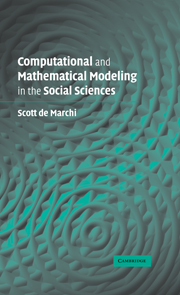Book contents
- Frontmatter
- Contents
- Acknowledgments
- Prelude
- 1 Not All Fun and Games: Challenges in Mathematical Modeling
- 2 Looking for Car Keys Without Any Street Lights
- 3 From Curses to Complexity: The Justification for Computational Modeling
- 4 Why Everything Should Look Like a Nail: Deriving Parsimonious Encodings for Complex Games
- 5 KKV Redux: Deriving and Testing Logical Implications
- 6 A Short Conclusion
- References
- Index
5 - KKV Redux: Deriving and Testing Logical Implications
Published online by Cambridge University Press: 23 July 2009
- Frontmatter
- Contents
- Acknowledgments
- Prelude
- 1 Not All Fun and Games: Challenges in Mathematical Modeling
- 2 Looking for Car Keys Without Any Street Lights
- 3 From Curses to Complexity: The Justification for Computational Modeling
- 4 Why Everything Should Look Like a Nail: Deriving Parsimonious Encodings for Complex Games
- 5 KKV Redux: Deriving and Testing Logical Implications
- 6 A Short Conclusion
- References
- Index
Summary
INTRODUCTION
For most of this book, the focus has been on the necessity of conducting out-of-sample statistical work to sort between competing models. Models are unfortunately not unique, even when they produce identical results. We thus face the task of choosing the most likely model from the class of logically consistent models using out-of-sample comparisons. But, as detailed in Chapter 3, it is often the case that the gap between the model and the empirical referent does not allow for dispositive tests. Or worse still, the amount or quality of available data precludes out-of-sample testing with statistical methods. In these situations, deriving logical implications of a model is a parsimonious way to test the model when the data are not accommodating.
King, Keohane, and Verba (1994) – henceforth KKV – emphasize the importance of deriving the logical implications of models, and I borrow heavily from their treatment in Chapter 1 of this book. Like KKV, I depend upon examples from physics to demonstrate that logical implications can be an alternative to statistical modeling. The problem, however, is that there are few examples in the social sciences of this approach to testing a model. KKV do not provide an extended example, and to this point, neither have I.
To address this shortcoming, I will return to the problem of nonseparable preferences featured in the Prelude. The focus will, however, shift to a topic that is more interesting to social scientists than recipes for hot fudge sundaes: voter preferences.
- Type
- Chapter
- Information
- Computational and Mathematical Modeling in the Social Sciences , pp. 144 - 175Publisher: Cambridge University PressPrint publication year: 2005

